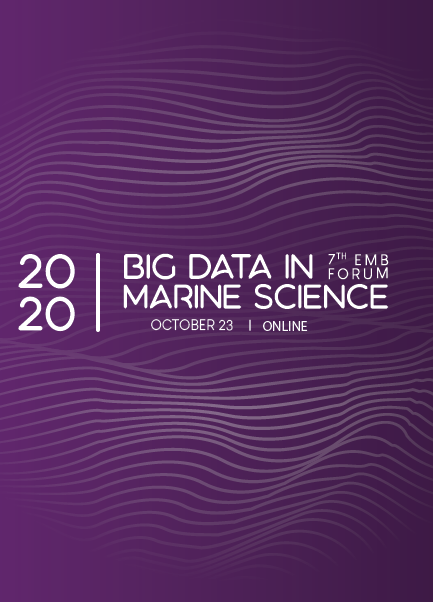
Practical Information
Date: Friday 23rd October 2020
Time: 10:00 - 17:05 CEST
Format: The 7th EMB Forum was hosted as a zoom webinar. You can watch the recordings on the EMB YouTube Channel.
Programme
Download the agenda here.
Download biographies for the speakers and panelists here.
Proceedings
Download the 7th EMB Forum Proceedings here.
Focus of the Sessions
The European Green Deal is a roadmap for making Europe’s economy sustainable and enabling this change through a just and inclusive transition. The roadmap provides actions to move to a clean and circular economy, become climate-neutral by 2050, stop biodiversity loss, and minimize pollution. It aims to turn the challenges of climate change and environmental degradation into opportunities across all policy areas. This session explores how big data and artificial intelligence applications in marine science can support priority actions of the European Green Deal including marine spatial planning, marine renewable energy, and the impact of climate change on fisheries.
The EU Biodiversity Strategy is a core component of the European Green Deal and was launched in May 2020. It provides a comprehensive, ambitious, and long-term plan for protecting nature and reversing the degradation of ecosystems for the benefit of people, the climate and the planet. It serves as the EU’s contribution to the international negotiations on the global post-2020 Biodiversity Framework and aims to support a green recovery after the COVID-19 pandemic. It also aims to build resilience to threats including climate change, food insecurity and disease outbreaks. This session discusses the role of big data, digitalization, and artificial intelligence in the conservation and restoration of marine biodiversity.
A Digital Twin Ocean is planned as part of the European Green Deal and the European Digital Strategy, and as part of a wider ambition to deliver a Digital Twin Earth under the ‘Destination Earth’ Initiative. Digital twins are virtual representations of real-world entities and a digital twin for the ocean should be a high-resolution, multi-dimensional digital replica in near real-time. It should integrate data, models and observations with digital technologies including cloud computing, high-performance computing, artificial intelligence and data analytics. The ambition of the Digital Twin Ocean is to transform data into knowledge and facilitate co-creation and transdisciplinary approaches to support decision-making. It should support simulations in which different scenarios can be tested and will help to create a sense of collective responsibility by citizens, governments and industries to manage the ocean as a global common. This session will discuss how big data and artificial intelligence can contribute to further developing the concept and priorities for the Digital Twin ocean.
Contact
Britt Alexander - European Marine Board secretariat